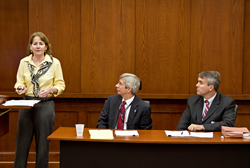
Melissa Hamilton, “Constitutional Law and the Role of Scientific Evidence: The Transformative Potential of Doe v. Snyder”, 58 Boston College Law Rev. E-Supplement 34 (2017)
Text Excerpts:
Hamilton, 35 …[T]he Sixth Circuit expressly recognizes scientific studies showing that sex offenders as a group do not pose a significant risk of recidivism risk.
….Snyder makes a contemporary case for the relevance in constitutional decision-making of data gathered from interdisciplinary scientific fields, particularly where such data conflict with legislative assumptions”
Hamilton, 36 …A foundational principle underlying these policies is the assumption that sex offenders pose a uniquely high risk of recidivism. In enacting such laws, policy-markers baldly assert that the need to protect the public justifies the special treatment of sex offenders. Courts have mostly rubber stamped this assertion without paying much heed to whether the presumption of future dangerousness is factually accurate. These decisions align with the perceptions of politicians, the media, and the public who have simply taken it on faith that sex offenders pose an extreme risk to the public, one that criminal sanctions fail to sufficiently thwart.
This presumption, however, has little basis in legitimate scientific study. In fact, the relevant statistics consistently support just the opposite – i.e., that sex offenders are not a singular and exceptional group that possess more than a negligible likelihood of sexually reoffending. Judges who ignore this evidence are complicit in perpetuating the unnecessary, unfair, and arbitrary laws that negatively impede upon the lives of individuals to who they apply. The Sixth Circuit’s decision in Snyder therefore represents a transformative venture, opening the door for judges to decide the important constitutional issues by examining relevant interdisciplinary research findings, to the benefit of defendants and the judiciary alike.”
Hamilton, 38 …In Doe v. Snyder the United States Court of Appeals for the Sixth Circuit was not so convinced that the scientific evidence supported this assertion. Instead, the court determined that empirical research failed to establish that Michigan’s SORA law was rationally related to the purpose of protecting public safety. The court looked to a statistical study indicating that sex offenders are actually less likely to recidivate than other types of criminals.”
Hamilton, 39…In the end, the foregoing factors led the Sixth Circuit to conclude SORA is punitive in nature
Hamilton, 41-2CONCLUSION Several commentators have noted the importance of Doe v. Snyder for challenging ‘civil’ sex offender legal regimes. Professor Doug Berman, a well-known sentencing law and policy blogger labels the Sixth Circuit’s ruling ‘significant’. A Slate report calls it a ‘vitally important’ decision that rightfully conceptualized such laws as ‘unconstitutional monstrosities’. Similarly, a commentator at Reason magazine indicates that the opinion reasonable recognizes that these sex offender laws are simply ‘stupid; and that ‘the court offered a scathing assessment that suggests such laws make little sense.
Snyder is a shining example of a court actually engaging with scientific evidence that refutes moralized judgements about a particularly disfavored group. Equally important, a reasonable interpretation of the Sixth Circuit’s opinion by many is that more of Michigan’s civil sex offender law, and other state laws like it, are now subject to a broader invalidation. Time will soon tell whether this specific case attracts the attention of the Supreme Court and its willingness to revisit its mistaken assumptions about the dangerousness of sex offenders collectively. Yet, whether or not the Supreme Court does so in the near future, the effect of the Snyder decision on the engagement of scientific data in constitutional law analysis has already been influential.
Originally appeared in “The Legal Pad” Volume 2, Issue 10 (October 20th, 2018) by Cyrus P. Gladden Ⅱ
Constitutional Law and the Role of Scientific Evidence_ The Trans




